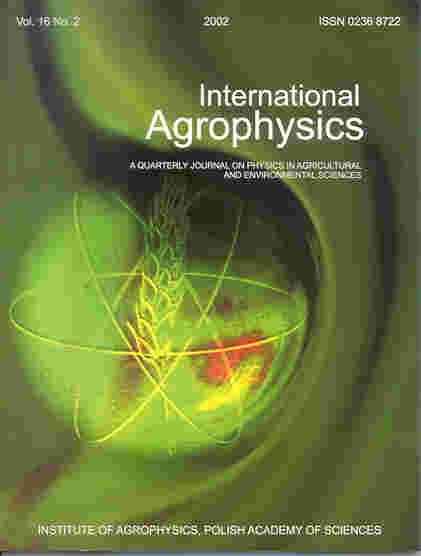|
|
|

|
|
| International Agrophysics |
| wydawca: | Instytut Agrofizyki
im. B. Dobrzańskiego
PAN
w Lublinie |
| ISSN: |
0236-8722 |
vol. 13, nr. 1 (1999)
|
|
|
poprzedni artykuł wróć do listy artykułów następny artykuł
|
|
|
The impact of tunnel cover type on growth and yield of sweet pepper
|
|
| (pobierz wersję PDF ) )
|
|
|
Siwek P., Libik A.
|
|
|
Department of Vegetable Crops, University of Agricultural, 29 Listopada 54, 31-425 Cracow, Poland |
|
|
vol. 13 (1999), nr. 1,
pp. 119-124
|
|
|
streszczenie
In the years 1995-1996 investigations on modification of microclimate in tunnels covered with polyethylene (PE) and polypropylene (PP) were conducted. The tunnels were covered with PE film and non-woven PP. Both materials had either natural colour ( transparent for PE and white for PP) or blue or red or green. Under these covers pepper plants of Mira cultivar were planted in early May. The transmittance of radiation through PE film and PP non-woven differed considerably. The film limited the quantity of radiation slightly but non-woven materials reduced the radiation rate remarkably, acting as an optical filter. As the result of shading and ventilation the temperature in the tunnels covered with porous non-woven PP the temperature was lower, which had a strong influence on the growth and yield of fruit. The plants under PP developed slower, produced less biomas and the ripening of fruits was delayed. The yield from the tunnels covered with PP was lower as compared to the yield from film tunnels. The highest yield was obtained under white non-woven, where the shading rate was the lowest. The small differences between fruit crops was obtained under film of various colours resulting from their high transmittance of radiation.
|
|
słowa kluczowe
fruit quality, growth, solar radiation, sweet pepper, temperature, yielding
|
|
|
|
|
|
|